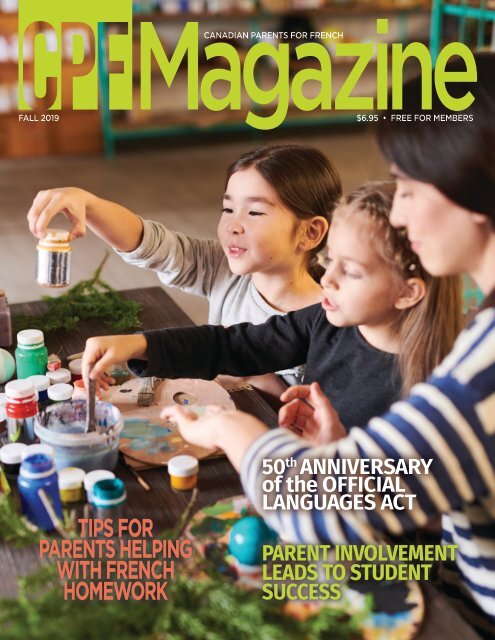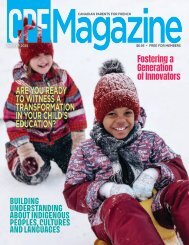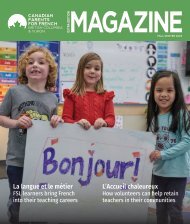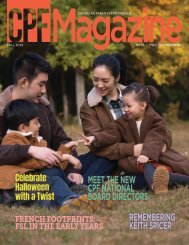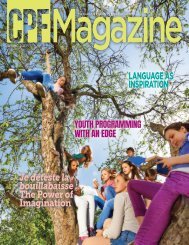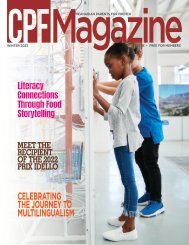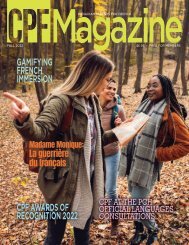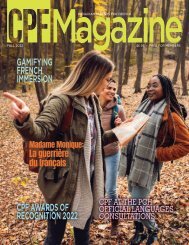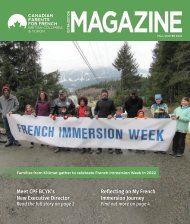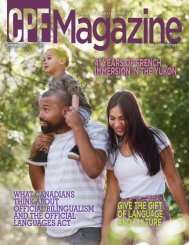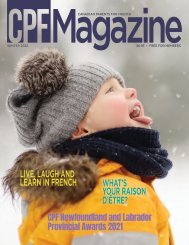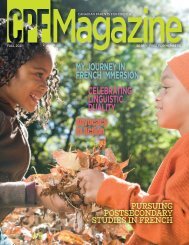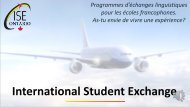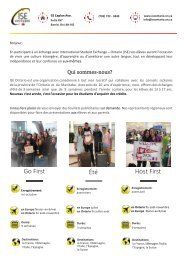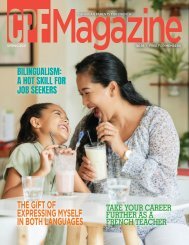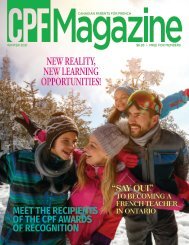CPFMagazine Fall 2019 Issue
A national network of volunteers, parents and stakeholders who value French as an integral part of Canada. CPF Magazine is dedicated to the promotion and creation of French-second-language learning opportunities for young Canadians.
A national network of volunteers, parents and stakeholders who value French as an integral part of Canada. CPF Magazine is dedicated to the promotion and creation of French-second-language learning opportunities for young Canadians.
You also want an ePaper? Increase the reach of your titles
YUMPU automatically turns print PDFs into web optimized ePapers that Google loves.
FALL <strong>2019</strong><br />
Magazine<br />
$6.95 • FREE FOR MEMBERS<br />
CANADIAN PARENTS FOR FRENCH<br />
TIPS FOR<br />
PARENTS HELPING<br />
WITH FRENCH<br />
HOMEWORK<br />
50 th ANNIVERSARY<br />
of the OFFICIAL<br />
LANGUAGES ACT<br />
PARENT INVOLVEMENT<br />
LEADS TO STUDENT<br />
SUCCESS
‘<br />
By just knowing the proper letter-sound blends<br />
YOU CAN<br />
readily read, write, speak and develop accurate fluency that results<br />
in better comprehension skills just by knowing how to decode the language.<br />
Watermelonworks French Sounds<br />
decodes the language one sound at a time!
Magazine<br />
CANADIAN PARENTS FOR FRENCH<br />
FALL <strong>2019</strong><br />
www.cpf.ca<br />
EDITORIAL COMMITTEE<br />
Michael Tryon, Nicole Thibault,<br />
Towela Okwudire, Denise Massie,<br />
Marcos Salaiza<br />
CONTRIBUTORS<br />
Chelsea Craig, Kate Peters, and<br />
other authors and organizations,<br />
as noted in their articles.<br />
EDITORIAL MANAGER<br />
Marcos Salaiza<br />
GRAPHIC DESIGN<br />
Stripe Graphics Ltd.<br />
PRINTING<br />
Trico Evolution<br />
SUBMISSIONS<br />
Canadian Parents for French<br />
1104 - 170 Laurier Ave. W.<br />
Ottawa, ON K1P 5V5<br />
(613) 235-1481, www.cpf.ca<br />
Advertising: Cathy Stone<br />
Canadian Parents for French<br />
Email: advertise@cpf.ca<br />
CPF Magazine is published three times per<br />
year for members of Canadian Parents for<br />
French. Our readership includes parents<br />
of students learning French as a second<br />
language, French language teachers,<br />
school board or district staff, and provincial,<br />
territorial and federal government staff<br />
responsible for official languages education.<br />
CHANGE OF ADDRESS<br />
To signal a change of address,<br />
contact Canadian Parents for French<br />
at (613) 235-1481, or email:<br />
cpf.magazine@cpf.ca<br />
Editorial material contained in this<br />
publication may not be reproduced<br />
without permission.<br />
Publications Mail Agreement No. 40063218<br />
Return undeliverable mail to Canadian<br />
Parents for French at the address above.<br />
To become an online subscriber, email<br />
cpf.magazine@cpf.ca. For an online version<br />
of this issue, visit www.cpf.ca.<br />
FALL <strong>2019</strong><br />
Table of Contents<br />
FEATURES<br />
4 Organ Donation Education… A Gesture for Life<br />
10 Highlights from Concours<br />
12 Inclusion in French Immersion:<br />
A Parent’s Perspective<br />
14 Parent Involvement Leads to Student Success<br />
REGULAR ARTICLES<br />
2 PRESIDENT’S MESSAGE<br />
3 CPF EDUCATION Don’t Get Frustré!<br />
Tips and Resources for Parents Helping<br />
with French Homework<br />
6 CPF ADVOCACY<br />
It’s Time to Modernize the Official Languages Act<br />
8 CPF INTERVIEW<br />
35 Years of French Immersion in Flin Flon, Manitoba<br />
16 CPF RESOURCE<br />
The Language Portal of Canada<br />
18 CPF RESOURCE<br />
Odyssey Program<br />
19 CPF LEARNING<br />
Linguistic Insecurity:<br />
A Key Barrier to Second Language Learning<br />
20 KEY CPF CONTACTS ACROSS CANADA<br />
20 OUR ADVERTISERS<br />
This issue of CPF Magazine is printed<br />
on 70lb Endurance Silk, using vegetable<br />
based inks. The paper is FSC certified by the<br />
Forest Stewardship Council® (FSC®), meaning<br />
it comes from well-managed forests and<br />
known sources, ensuring local communities<br />
benefit and sensitive areas are protected.<br />
Canadian Parents for French is a nationwide, research-informed, volunteer organization<br />
that promotes and creates opportunities to learn and use French for all those who<br />
call Canada home.
PRESIDENT’S MESSAGE<br />
O<br />
nce again, the fall season has arrived.<br />
Time to get back into routines, register<br />
for extracurricular activities, make<br />
back-to-school purchases, and settle the<br />
nerves of our students as they head back to<br />
the classroom. Across the country, Canadian<br />
Parents for French will host French Second<br />
Language (FSL) orientation meetings, offer tips<br />
for parents and students, and plan activities<br />
where students have an opportunity to use<br />
their French outside of the classroom.<br />
Although there have been changes in FSL<br />
programming in many areas across the country,<br />
Branch and the National websites have resources<br />
for those seeking information on FSL options<br />
and advocacy.<br />
Canadian Parents for French has had many<br />
successes this past year. Our Concours competition<br />
saw a record number of participants. Many thanks<br />
to those who provided prizes and to those who<br />
adjudicated the competitions. This year marks the<br />
50 th anniversary of the Official Languages Act. Many<br />
consultations took place across the country to gather<br />
information on potential changes and additions.<br />
I am proud to say that Canadian Parents for French<br />
participated in each of them and was acknowledged<br />
in the summary report as well as at the Symposium<br />
held in Ottawa this spring. Our FSL Awareness<br />
Breakfast, held in Ottawa in April with representation<br />
from Branches across the country, was well attended<br />
by politicians and stakeholders. The breakfast<br />
was followed by a number of meetings with<br />
influencers where CPF had opportunities to present<br />
our successes and concerns. It is hoped that the<br />
Branches will host some sort of similar event in<br />
the future. Our latest State of FSL Education in<br />
Canada Report will be launched at our CPF Leader<br />
Networking Event in October.<br />
One of the issues that came out of the<br />
consultation process was the concept of “Linguistic<br />
Security”. Where do our FSL students and graduates<br />
fit with respect to the francophone community? Do<br />
they feel secure in speaking French outside of the<br />
classroom? This subject is explored more fully in<br />
one of the articles in this magazine. There are other<br />
articles on Concours, the Official Languages Act,<br />
and Parent Engagement that are worth reading.<br />
I would encourage you to take advantage of<br />
the opportunities that membership in Canadian<br />
Parents for French provides. Enjoy this edition of<br />
our magazine and please share it with others who<br />
support French second language learning. n<br />
Nancy McKeraghan, CPF National President<br />
EXCLUSIVE OFFER<br />
to CPF members!<br />
Linguistic Duality Makes Canada Stronger<br />
To celebrate the 50 th anniversary of the Official Languages Act, we have<br />
released this poster by Marc Keelan-Bishop that illustrates 25 bilingual<br />
exchanges between Canadians. If you want to receive a copy of the poster,<br />
contact Debbie Murphy, dmurphy@cpf.ca and we will mail one to you!<br />
on French magazines edited in Quebec<br />
for your children<br />
To subscribe:<br />
bayardjeunesse.ca/CPF<br />
2 CPF MAGAZINE FALL <strong>2019</strong>
DON’T GET<br />
CPF EDUCATION<br />
frustré!<br />
Tips and Resources for Parents Helping with FrencH Homework<br />
With back to school, many parents<br />
will find ourselves back to<br />
Homework Help!<br />
Although there is disagreement<br />
around the topic, homework does teach<br />
students to work independently and<br />
develop self-discipline and responsible<br />
character traits. It can encourage students<br />
to take initiative and responsibility for<br />
completing a task. And, it does allow<br />
parents to have an active role in their<br />
child's education and become familiar<br />
with their child's progress. Research<br />
has consistently shown that parental<br />
involvement in a child's learning is a<br />
key factor in that child's achievement in<br />
school. Ideally, we, as parents, can use<br />
homework time to focus on building<br />
strong study habits.<br />
Create a Learning Space<br />
n Set up a quiet space that limits<br />
distractions where your child can focus.<br />
Collect and store some reference texts<br />
like personal dictionaries and class<br />
word lists ready for use.<br />
n Create a schedule with your child to<br />
develop a homework routine that is<br />
realistic and fits around other afterschool<br />
activities. Prioritize - It is<br />
important to ensure that students are<br />
not exhausted by the time they work on<br />
their homework.<br />
n Time management is an important skill<br />
for students to develop – eliminate<br />
distractions for a given time period, plan<br />
ahead, break things down into steps. Use<br />
a calendar, an agenda and a checklist.<br />
Make Connections by Asking<br />
Questions<br />
n Ask your child to explain what the<br />
assignment is about; how it connects<br />
to what is happening in class and then<br />
help make connections to your family<br />
life and community.<br />
n Ask your child about the learning<br />
strategies being taught and used in<br />
the classroom and then offer reminders<br />
of their use during the completion<br />
of the assignment; strategies such as<br />
activating prior knowledge, expressing<br />
main ideas, asking questions and<br />
locating facts, sequencing events,<br />
summarizing key points, and visualizing<br />
are all very useful.<br />
Suggest and Use Support<br />
Resources<br />
n Sharing some go-to websites, online<br />
tools can make a difference and save<br />
time on researching, writing and<br />
editing assignments.<br />
n Help your child consider multiple<br />
sources and ask such questions as to<br />
who is providing this information and<br />
why? Is it a reliable source?<br />
Homework Buddies<br />
n Encourage your child to exchange<br />
contact numbers with friends from<br />
class so they can speak to each to<br />
potentially help review together.<br />
n Communicate with other parents<br />
and the teacher to exchange ideas,<br />
challenges and support each other. n<br />
FRENCH HOMEWORK HELP SITES<br />
Bescherelle is best known for its written<br />
counterpart, a guide to hundreds of verbs in the<br />
French language, but you don’t have to run to the<br />
bookstore just yet. Bescherelle is also available online!<br />
http://bescherelle.com. you can look up any<br />
verb and find it in all verb tenses and participles. In<br />
addition to the conjugator, the Bescherelle website<br />
includes “dictées” to practice both listening and<br />
writing skills, quizzes about verbs and their tenses<br />
as well as other grammar points such as nouns and<br />
adjectives. You may want to consider subscribing to<br />
their newsletter.<br />
Larousse is a reliable French dictionary that’s also<br />
available online, www.larousse.fr. You can search any<br />
French word and get an in-depth look at its meaning,<br />
with some context. It offers a monolingual French<br />
edition as well as bilingual editions. It offers a verb<br />
conjugator, an encyclopedia and forums for people to<br />
post questions.<br />
Linguee, English-French dictionary, www.linguee.fr,<br />
provides example sentences and recorded pronunciations.<br />
Input a phrase, expression or sentence part and<br />
several examples are provided, allowing you to choose<br />
the best solution for your context. Very helpful for<br />
technical or specialized vocabulary translations.<br />
BonPatron is an online French grammar and spell<br />
checker, https://bonpatron.com. It is a wonderful<br />
resource for those who need a complete revision<br />
of French written compositions and not just simple<br />
word look-ups and verb conjugations. Created at the<br />
University of Alberta by Terry Nadasdi and Stefan<br />
Sinclair. Simply paste your finished written work into<br />
the space, the checker identifies your spelling and<br />
grammar errors, suggests corrections and offers a<br />
short explanation for the mistake made.<br />
Alloprof is a website from Québec, www.alloprof.<br />
qc.ca, that offers students a wealth of resources including<br />
personalized homework help with access to connect<br />
directly with French educators. There is a text message<br />
service where students can text their questions and<br />
receive text message answers. The second service is<br />
by telephone, where students call in their questions<br />
and receive one-on-one over the phone support. Both<br />
services are available Monday through Thursday, 5<br />
p.m. to 8 p.m. (Eastern time zone). The site also offers<br />
tools such as exercises to review and practice grammar<br />
and vocabulary skills, a virtual library and a forum to<br />
communicate with other French learners.<br />
CPF MAGAZINE FALL <strong>2019</strong> 3
ORGAN DONATION EDUCATION<br />
A Gesture<br />
for Life<br />
HAVE YOU HEARD OF CHAÎNE DE VIE?<br />
BY JUDITH ROHLF, CO-AUTHOR OF CHAÎNE DE VIE<br />
Source : Canadian Blood Services<br />
chainedevie.org<br />
CHAÎNE DE VIE is an organization whose mission it is to educate<br />
young people in secondary school about organ and tissue<br />
donation and make them ambassadors of family discussions about<br />
this subject. It also hopes to help them realize the importance of<br />
a healthy body and appreciate the greatest gift of all —life. To<br />
date, more than 100,000 young people have been reached by this<br />
message of capital social importance.<br />
It all began over 10 years ago with a spark by a student from<br />
Rivière-du-Loup, a city 150 km east of Québec City. Then, over<br />
the years, CHAÎNE DE VIE has grown and evolved thanks to a<br />
competent and passionate team, whose patience and faith have<br />
never waned, and to the financial support of several individuals<br />
and organizations, including Desjardins. CHAÎNE DE VIE won<br />
its spurs when it became a registered charity in 2017. The<br />
Kamouraska–Rivière-du-Loup School Board and Transplant Québec<br />
are its official partners. (Transplant Québec is the organization that<br />
coordinates the organ donation process in Quebec.)<br />
Founded by Lucie Dumont, a real ball of fire, CHAÎNE DE VIE<br />
has expanded throughout Quebec and beyond! More than a<br />
school project, it has become a true movement of solidarity<br />
for life. In Canada, there will be pilot projects in Vancouver<br />
and Prince Edward Island in the upcoming school year.<br />
For CHAÎNE DE VIE, the stakes are high. Although the vast<br />
majority of Canadians say they are in favour of organ donation,<br />
many potential organ donations do not happen, often because<br />
the family is unaware of their loved one's wishes. The medical<br />
team always respects the family's decision. Signing your health<br />
or donor card is not enough. You must talk about it.<br />
By presenting the facts and real-life stories to young people<br />
aged 15 to 17, CHAÎNE DE VIE raises their awareness about<br />
organ and tissue donation and helps them make an informed,<br />
personal decision about it. Then, they are invited to share this<br />
decision with their parents. By debunking the myths that still<br />
exist regarding organ and tissue donation, by encouraging family<br />
discussions on the subject and by sharing our wishes with our<br />
loved ones, more lives are saved. And, for those on the waiting<br />
list for the transplant that will give them a second chance at life,<br />
CHAÎNE DE VIE represents a true glimmer of hope.<br />
Thanks to donations and an annual fundraising event,<br />
CHAÎNE DE VIE can continue to spread its wings. The money<br />
collected goes to training teachers, furnishing schools with<br />
ready-to-use kits with quality material, developing new<br />
educational tools, adapting the material to fit different needs<br />
and promoting CHAÎNE DE VIE.<br />
4 CPF MAGAZINE FALL <strong>2019</strong>
" Education is the most<br />
powerful weapon which you<br />
can use to change the world."<br />
– NELSON MANDELLA<br />
" Presently, nothing compares in terms of the depth of the contents for<br />
students this age. CHAÎNE DE VIE is unifying, brilliant, current, and it<br />
allows for language learning, while at the same time providing<br />
reflection on a reality that can leave no one indifferent."<br />
ITS GOAL:<br />
That CHAÎNE DE VIE be taught in all secondary<br />
schools and its message reach the entire<br />
population. This is no easy task, to be sure.<br />
But, together, we can move mountains!<br />
CHAÎNE DE VIE: AN ORGANIZATION<br />
THAT HELPS SAVE LIVES!<br />
CHAÎNE DE VIE brings together the fields of health and<br />
education with a message of hope for those waiting for a<br />
transplant. It allows young people to make an informed,<br />
personal decision regarding this important issue in today's<br />
society and encourages them to become our ambassadors of<br />
family discussions about organ and tissue donation (including<br />
bone marrow).<br />
We encourage CPF members to share this information<br />
with your local school. CHAÎNE DE VIE resources are available<br />
in both French and English – an excellent opportunity for<br />
authentic language learning. n<br />
Test your knowledge.<br />
True or False?<br />
1<br />
Only<br />
2<br />
There<br />
3<br />
A<br />
4<br />
5<br />
Registering<br />
about 1% of the population of Canada dies in<br />
conditions that allow for the donation of their organs.<br />
is no age limit for donating<br />
one's organs.<br />
rich and famous person has a greater chance of<br />
receiving an organ if they need one.<br />
A person can save several lives by donating<br />
their organs.<br />
your consent to donate or signing your<br />
health or donor card is all you need to do to be an<br />
organ and tissues donor.<br />
Answers:<br />
1. True. In Canada, this represents approximately 2,500 persons a year.<br />
2. True. In Canada, the youngest donor was only 48 hours old and<br />
the oldest was 92 years old.<br />
3. False. People waiting for a transplant are placed on a waiting list. The attribution<br />
of organs is based on various factors including blood type, tissue compatibility,<br />
weight, size, urgency and the date of inscription on the waiting list.<br />
4. T rue. A single person can save up to eight lives and improve the quality<br />
of life of 20 others by donating their organs.<br />
5. False. While this is the official way of expressing your wishes, you must<br />
also let your loved ones know because the final decision will be theirs.<br />
CPF MAGAZINE FALL <strong>2019</strong> 5
CONSULTATIONS, SYMPOSIA, AND REPORTS<br />
It’s Time to Modernize the Official Languages Act<br />
SUMMARY REPORT BY NICOLE THIBAULT, CPF EXECUTIVE DIRECTOR, NATIONAL<br />
<strong>2019</strong> marks the 50 th anniversary of<br />
the Official Languages Act (Act). The Act<br />
has undergone only one major revision<br />
30 years ago, in 1988. The current Act<br />
specifically outlines protections for the<br />
minority language community. It should<br />
play a key role in the lives of all Canadians<br />
since its purpose is to:<br />
n Ensure respect for English and French<br />
as the official languages of Canada<br />
in government and parliamentary<br />
institutions.<br />
n Support the development and vitality of<br />
official language minority communities.<br />
n Set out the powers, duties and functions<br />
of federal institutions with respect to the<br />
official languages of Canada.<br />
n Affirms the right in certain<br />
circumstances to communicate with<br />
and receive services from federal<br />
institutions in the official language of<br />
one’s choice and to work in English or<br />
French in federal institutions.<br />
The Act also gives individuals the right<br />
to express themselves in the language of<br />
their choice before the federal courts. It<br />
promotes English and French and supports<br />
the vitality of official language minority<br />
communities across the country, so that all<br />
individuals can enrich the country through<br />
their contribution.<br />
Yet, throughout the consultations<br />
undertaken in 2018-<strong>2019</strong>, Canadians<br />
identifying with the majority language<br />
group do not feel they are directly<br />
addressed. Modernizing the Act is an<br />
opportunity to ensure that it meets the<br />
needs of today’s diverse Canadian society,<br />
responding to the increased demand for<br />
French second language (FSL) learning<br />
programs across the country.<br />
As the Government of Canada has<br />
set an ambitious target, to increase our<br />
national bilingualism rate from 17.9% to<br />
20% by 2036, Canadian Parents for French<br />
offered five main recommendations<br />
during the many consultations:<br />
A. Incorporating a new section to establish<br />
access to FSL education as a right or<br />
guarantee for non-rights holders;<br />
B. Broadening the definition of<br />
“francophone” and of “minority linguistic<br />
community” in Section 32(1)2(a) to be<br />
inclusive of Canadians whose mother<br />
tongue is not French but who are French<br />
speakers and are interested in accessing<br />
services in French;<br />
C. Expanding the Act to be more<br />
inclusive of and serve all Canadians,<br />
by modifying Sections 43(2) and 45 in<br />
order to guarantee consultation with<br />
organizations promoting FSL education;<br />
D. Expanding and strengthening the<br />
mandate of the Minister of Canadian<br />
Heritage (or designated Minister)<br />
(Section 43(1)e) to require and assist<br />
provincial governments to provide<br />
opportunities for FSL; and<br />
E. Officially recognizing the role<br />
played by French speakers (rights and<br />
non-rights holders) in the vitality of<br />
minority language communities.<br />
In May <strong>2019</strong>, the Government of<br />
Canada shared a Summary Document:<br />
Engaging Canadians as a Step Towards<br />
Modernizing the Official Languages Act.<br />
Regional trends are noted, key themes<br />
featured, with five broad areas<br />
of consensus having emerged:<br />
n The importance of including and raising<br />
awareness among linguistic majorities;<br />
n Official languages embodied in<br />
individual experiences;<br />
n The value of Indigenous languages;<br />
n The potential of technologies as a driver<br />
of innovation; and,<br />
n The place of culture in the Act.<br />
6 CPF MAGAZINE FALL <strong>2019</strong>
CPF ADVOCACY<br />
In June <strong>2019</strong>, the House of Commons<br />
Standing Committee on Official Languages<br />
released its final report, Modernization<br />
of the Official Languages Act, which<br />
examined three areas: the oversight<br />
framework, Part VII which mandates<br />
government departments to advance<br />
English and French, and the impact of the<br />
Act as a tool for social cohesion.<br />
CPF National testified before the<br />
Committee in April <strong>2019</strong>, and our<br />
Network positions are reflected in the<br />
final report which puts forward 11<br />
recommendations to modernize the Act<br />
including a specific recommendation<br />
that the new Act promote bilingualism<br />
in Canada. The report shares interesting<br />
reflections and commentary and urges<br />
the Commissioner of Official Languages to<br />
examine the definition of linguistic duality<br />
with a view of renewing it to reflect<br />
Canada’s reality.<br />
EXCERPTS FROM THE REPORT:<br />
n For the Act to benefit all Canadians, the<br />
Committee believes it must embrace<br />
a new paradigm or way of thinking in<br />
which all of its parts are based on a<br />
new premise …<br />
n A new definition of linguistic<br />
duality must focus on common<br />
ground between anglophones and<br />
francophones, particularly bilingual<br />
Canadians, and on reciprocity and<br />
mutual benefit between the majority<br />
and the minority …<br />
n From a language rights perspective, a<br />
new vision of the dynamics between<br />
linguistic majorities and linguistic<br />
minorities is needed …<br />
n It is difficult to reach the linguistic<br />
majority when the Act, a cornerstone<br />
of the language regime, does not even<br />
recognize the contribution of bilingual<br />
Canadians – members of either<br />
linguistic majority who have chosen to<br />
learn their second official language.<br />
n The increase in official bilingualism<br />
among young people suggests greater<br />
use of both official languages in<br />
Canadian society in years to come<br />
(Statistics Canada).<br />
n Official languages should enable all<br />
Canadians, regardless of their culture or<br />
mother tongue, to participate actively<br />
in Canadian society.<br />
Overall CPF is pleased with the<br />
results of the consultations, symposia,<br />
and reports which puts forth<br />
recommendations that will make the<br />
Act far more inclusive and relevant for<br />
all Canadians and we will continue our<br />
involvement in this process in the year<br />
to come as it relates to promoting and<br />
creating opportunities for youth to learn<br />
and use French. n<br />
Lecture Écriture Maths Grammaire Techniques d’étude Aide aux devoirs Anglais<br />
Plus de 123<br />
centres au<br />
Canada !<br />
POUR DE MEILLEURS RÉSULTATS<br />
CETTE ANNÉE, IL VOUS FAUT<br />
OXFORD LEARNING<br />
TOUS ÂGES. TOUS NIVEAUX. TOUTES MATIÈRES.<br />
INSCRIVEZ VOTRE ENFANT DÈS MAINTENANT !<br />
FOR BETTER GRADES THIS YEAR<br />
YOU NEED OXFORD LEARNING<br />
ALL AGES. ALL GRADES. ALL SUBJECTS.<br />
ENROL TODAY!<br />
oxfordlearning.com/fr<br />
Fier d’être une entreprise canadienne<br />
Joignez-vous à la conversation !<br />
CPF MAGAZINE FALL <strong>2019</strong> 7
CPF INTERVIEW<br />
35 YEARS OF FRENCH IMMERSION IN<br />
Flin Flon, Manitoba<br />
BY CHELSEA CRAIG, PROJECT COORDINATOR, CPF QUEBEC & NUNAVUT<br />
On May 24th, CPF organized a 35th Anniversary Celebration of French immersion in Flin Flon. The event was held at the<br />
École McIsaac School and involved entertainment, a student art auction, and a wonderful choral performance with the<br />
K-5 students. There were many people to thank: from those bringing greetings to our bilingual emcee, to the CPF Flin<br />
Flon Chapter – past and present – Executive, and to all the teachers, parents and students who came out to make the<br />
evening an overwhelming success.<br />
The celebration provided an opportunity to interview some of the graduates of the program. Andie Shaw, Haleigh<br />
Belcourt, and Hanna Baynton shared their experiences with French immersion and their advice for other students.<br />
How did your experience with French<br />
immersion learning change your<br />
perspective? In other words, what did<br />
you learn about Canada and what did<br />
you learn about yourself?<br />
Andie Shaw (AS): I was in my earlier years<br />
of French immersion when I learned that<br />
the two official languages of Canada are<br />
English and French. I think this is great<br />
because I believe that it is important<br />
to have the knowledge of our nation's<br />
official languages, even if it is only a little.<br />
As for myself, I learned that I absolutely<br />
love being bilingual and the fact that it<br />
has opened more doors for me compared<br />
to if I wasn't. I was fortunate enough to<br />
be accepted into the world's top bilingual<br />
university in our nation's capital thanks to<br />
my decision to enrol and remain in French<br />
immersion until the end of high school.<br />
Haleigh Belcourt (HB): French immersion<br />
learning changed my perspective by<br />
showing me how big and diverse the world<br />
really is. When I was younger and would<br />
think about French, I always assumed it was<br />
only common in Quebec and France. Being<br />
in French immersion really opened my<br />
eyes to the fact that French is everywhere,<br />
especially in Canada. Not only learning this<br />
in a classroom, but having opportunities to<br />
meet new people and learn about where<br />
they're from because I was fortunate<br />
enough to learn a second language.<br />
Hanna Baynton (Hanna): Being in<br />
French immersion definitely gave me the<br />
perspective of multiple cultures. In school<br />
we didn’t just learn about Canadian culture<br />
but also that of France and even the<br />
culture of Quebec. I definitely think that<br />
being in French gave me a different view of<br />
the history of Canada because we looked<br />
deeply into both the English side and the<br />
French side. I don’t know if it’s something<br />
I really learned about myself but being in<br />
French immersion definitely challenged me<br />
in ways that solely being in English would<br />
not. My mom told me once that being an<br />
English student would have been too easy<br />
for me with the way that my brain works.<br />
What skills do you think are required<br />
to be successful at learning a second<br />
language?<br />
AS: First off, I do believe that having a<br />
great teacher makes a big difference.<br />
Having a teacher who is passionate about<br />
the language that they teach and who is<br />
patient is very important in successfully<br />
learning a new language. Second, I believe<br />
that the famous statement, 'practice<br />
makes perfect!' really is true. I'll admit, it<br />
is easier said than done, but the more one<br />
practices and speaks the language as much<br />
as possible will eventually help the learner<br />
to succeed and be worth it in the long run!<br />
HB: I think that while learning a second<br />
language is hard, anyone can do it.<br />
Some skills that I think are helpful to be<br />
successful at learning a second language<br />
are being patient, being dedicated to<br />
learning and practicing, and helping<br />
others learn because it will help your<br />
skills improve too.<br />
8 CPF MAGAZINE FALL <strong>2019</strong>
CPF INTERVIEW<br />
This piece of art was donated by Aubrianna in Grade three: A huge cake on a table<br />
with spoons, knives, forks, and plates, all outlined in sharpie.<br />
This piece of art was donated by Matteo in Grade one: Beautiful Hydrangeas created using a bubble painting technique.<br />
This piece of art was donated by Cynthia in Grade three: A poster for the<br />
35th anniversary: I Love Speaking French.<br />
Hanna: I think anyone can learn a<br />
second language at any age if they have<br />
determination and perseverance. There<br />
are no specific skills required but you<br />
definitely have to be willing to work at it.<br />
What advice would you give to other<br />
French Second Language students?<br />
AS: Don't give up! Learning a second<br />
language isn't easy. It can become very<br />
frustrating and the thought of giving up<br />
all together may cross your mind here<br />
and there. But you just have to keep<br />
telling yourself that this is worth it and<br />
that you'll be happy when you are able to<br />
speak with a person who is only fluent in<br />
French, or you are hired into a position<br />
that requires you to be bilingual. It is<br />
always worth it!<br />
HB: Some advice that I would give other<br />
French Second Language students would<br />
be to not second guess yourself, to not<br />
be embarrassed to make mistakes, and to<br />
not be afraid to use your second language,<br />
especially with native speakers of that<br />
language. It can be a bit intimidating to use<br />
your second language with someone who's<br />
been speaking it their whole life, but I can<br />
assure you that they will appreciate that<br />
you're trying to use their language rather<br />
than assuming they'll speak yours.<br />
Hanna: Incorporate it into your every<br />
day life. Listen to French music, read<br />
French articles/books, journal in French.<br />
Surround yourself with it just as you are<br />
surrounded by English otherwise you will<br />
never continue to improve.<br />
What is your favourite memory about<br />
learning French?<br />
AS: My favourite memories are all of the<br />
amazing teachers and professors I've had<br />
over the last 15 years. They really make<br />
all the difference in learning a second<br />
language and I don't have a single bad<br />
thing to say about any of them. Each and<br />
every one has helped me to get to where<br />
I am today. I also really enjoyed the trips<br />
we would take as a French immersion<br />
class, to places such as St. Boniface as<br />
well as the special presentations and<br />
guests we would have that the English<br />
classes didn't.<br />
HB: When I think about my time learning<br />
French, it's full of good memories. I guess<br />
the times I think of first would be just<br />
regular French classes in high school.<br />
We always had lots of fun times. When<br />
we would have group discussions, we'd<br />
always be laughing and making jokes.<br />
So I guess my favourite memory about<br />
learning French is the people I learned<br />
it with.<br />
Hanna: I really enjoyed the fact that it<br />
was like being in a family. Being in a class<br />
with the same people year after year<br />
meant that we really got to see each<br />
other grow and become the people we<br />
are today. We learned things about one<br />
another that I don’t think is very normal<br />
in English classes. We also got to enjoy<br />
cool trips and events that were only for<br />
French kids. n<br />
CPF MAGAZINE FALL <strong>2019</strong> 9
À la proc<br />
This past summer, Canadian Parents<br />
for French, National, hosted the<br />
17 th edition of the Concours d’art<br />
oratoire National finals in which young<br />
students from all across Canada once<br />
again showcased their public speaking<br />
abilities and put into practice their French.<br />
This year for the first time in the<br />
history of the competition, participants<br />
from Ontario, Manitoba, and<br />
Saskatchewan were able to be a part<br />
of a National level Impromptu Contest<br />
which added an exciting element to<br />
the traditional contest. The Impromptu<br />
competition was well received by<br />
participants and it was a good first<br />
experience as we continue looking for<br />
ways to motivate young students to use<br />
their French oral communications skills in<br />
more spontaneous ways.<br />
Like every year, besides competing,<br />
students were able to enjoy a weekend<br />
in Ottawa-Gatineau and experience<br />
bilingual activities in the National<br />
Capital Region. It is always important to<br />
celebrate their many hours of hard work<br />
with fun activities outside the classroom<br />
or competition environment and to meet<br />
other like-minded individuals motivated<br />
to use French and perhaps even develop<br />
life-long friendships.<br />
Post-Concours, students completed<br />
a survey for us to better understand their<br />
experience and to improve the whole<br />
process, from registration to travel to<br />
activities. Overall participants agreed that<br />
they feel that their French skills improved<br />
by participating at Concours:<br />
“ Doing the speech really allowed me to<br />
improve on my French diction, grammar,<br />
and pronunciation in a way that would<br />
not have been possible otherwise…”<br />
“ I’ve noticed a great improvement in my<br />
public speaking abilities. I also used this<br />
opportunity to use French more often, since<br />
I was surrounded by French speakers for<br />
most of this great experience…”<br />
“ Speaking French is the most challenging<br />
aspect of learning it, so it really helps to<br />
have a competition where you must speak<br />
and formulate responses in French…”<br />
Participants all enjoyed meeting<br />
fellow students from across the country<br />
that have similar interests with whom<br />
they were able to share their French<br />
learning experiences:<br />
“ My favorite part of the weekend was<br />
getting to spend a weekend immersed<br />
in French and getting to meet like-minded<br />
people who had similar interests. Also<br />
getting to know French speakers from<br />
all over Canada!”<br />
“ I made so many amazing friends this<br />
weekend and it was awesome getting<br />
to spend some time just having fun<br />
with them…”<br />
“ I met a lot of people who were excited<br />
about French and that has motivated<br />
me to continue learning and practicing…”<br />
CPF National thanks all participants,<br />
parents, judges, sponsors, and volunteers<br />
that were able to join us for the <strong>2019</strong><br />
edition of the Concours National<br />
Finals. Your support is instrumental<br />
in promoting French second language<br />
learning and the importance of linguistic<br />
duality across Canada. n<br />
THIS YEAR’S<br />
Late Immersion<br />
Mohamed Elnagary – Winnipeg, MB<br />
BY THE NUMBERS<br />
n 62,000 students competed overall<br />
at Concours across Canada.<br />
n 47 high school students traveled<br />
to Ottawa and participated at the<br />
National finals.<br />
n 6 categories based on level of French<br />
language proficiency – new this year:<br />
Impromptu!<br />
n 97% of participants enjoyed presenting<br />
their speech.<br />
n 88% of participants enjoyed getting<br />
to know the other finalists.<br />
n 97% of participants said that they would<br />
recommend National Concours.<br />
10 CPF MAGAZINE FALL <strong>2019</strong>
haine!<br />
HIGHLIGHTS<br />
FIRST PLACE WINNERS<br />
FROM<br />
CONCOURS<br />
<strong>2019</strong><br />
Impromptu Yi Fei Tao – Ottawa, ON<br />
Francophone Xavier Champagne – Winnipeg, MB<br />
Core/Basic French<br />
Shubhneet Thind – Winnipeg, MB<br />
Early Immersion<br />
Tyler Woodburn – Gatineau, QC<br />
Core Extended/Enriched Advanced<br />
Angelina Shaw – Toronto, ON<br />
CPF MAGAZINE FALL <strong>2019</strong> 11
Inclusion<br />
in French<br />
Immersion<br />
A Parent’s Perspective<br />
BY KATE PETERS, CPF NATIONAL, DIRECTOR AT LARGE<br />
There was never any question that Nicholas would be enrolled<br />
in a French immersion program. Learning French was one<br />
of his family’s core values – his sister had been through<br />
immersion, his father was bilingual, and his mother believed in the<br />
importance of learning Canada’s official languages and the benefits of<br />
bilingualism. But from the very beginning, Nicholas was discouraged<br />
from continuing in the program. In his first year, and every year<br />
thereafter, his parents were advised to remove him from French<br />
immersion. They knew he had some learning challenges, but it took<br />
years to get the school to have him tested. Once diagnosed, they<br />
found that the supports and accommodations Nicholas needed to<br />
be successful were unavailable. Teachers and administration alike<br />
seemed unable to help.<br />
But today, Nicholas is bilingual and enrolled in French courses<br />
in high school. His story confirms research that shows that learning a<br />
second language is beneficial for all, improving literacy, self-efficacy,<br />
executive functioning, and even skills in science and math. Research<br />
also shows that with the right accommodations, all kids can be<br />
successful in learning French. The struggle of Nicholas' parents to<br />
keep him in French immersion is a case study in another documented<br />
phenomenon: French as a Second Language (FSL) classrooms are not<br />
always inclusive of students with learning challenges. The situation is<br />
challenging for students, parents and teachers. Parents may struggle<br />
to navigate the system and to know who to trust when teachers<br />
and administrators advise them to remove their children from the<br />
program. Parents of children with challenges need to become strong<br />
advocates to support their success, and especially to keep them in FSL<br />
programs. Here are some tips.<br />
What parents can do outside school – Reflecting on ten years of<br />
navigating the system to keep their son in immersion, Nicholas’<br />
parents believe that what Nicholas did after school was just as important<br />
as what happened in the classroom. “We found places where he<br />
could excel” they explain. He always loved sports, so soccer became<br />
a focus. Winning on the field was an important counterbalance to<br />
his struggle in the classroom. They also built a web of supports for<br />
both Nicholas and his family. Mentorship was valuable to Nicholas,<br />
who saw that there were many ways to be successful that weren’t<br />
academic; and it shored up his parents, who learned from other<br />
parents who had been through the same sorts of challenges.<br />
What parents can do within the system – Families whose children<br />
are struggling academically are often encouraged to withdraw their<br />
child from the FSL program and place them in an English stream<br />
program or school. Teachers and administrators believe that if a<br />
student is struggling, for instance due to a learning disability, then<br />
the best option is a program where more supports are available.<br />
Parents faced with these pressures and the advice from teachers<br />
and administration may feel like they have to make a choice<br />
between the opportunity for their child to learn French, and<br />
programs which meet their child’s specific needs. It is not surprising<br />
that researchers have identified in this situation an equity issue<br />
in French immersion and special education in Ontario (Arnett &<br />
Maddy, 2010). So what can parents do to advocate for their child<br />
within the system?<br />
Engaging early and often – Nicholas’ parents describe how each<br />
year, they would start anew with teachers who sometimes lacked<br />
training on how to accommodate students’ learning needs. In their<br />
experience, the burden of the accommodation was often placed<br />
on the family. This burden was both emotional and financial – they<br />
were expected to pay for assessments or specialized materials to<br />
12 CPF MAGAZINE FALL <strong>2019</strong>
accommodate alternate learning in reading or math. They found that<br />
teachers sometimes couldn’t help, and lacked training or knowledge<br />
on how to accommodate. That said, there were some teachers in<br />
Nicolas’ journey who made extraordinary efforts to support his<br />
needs. Nicholas and his parents were able to work with these<br />
teachers to find the best way for him to be successful.<br />
Getting the right support for your child – Another consequence<br />
of the system’s culture is that outliers have often been streamed<br />
out of programs leaving students who are more academically<br />
successful. Countering this inertia required that they start as early<br />
as August or September each school year, asking for supports and<br />
accommodation. They would meet the teacher and administration<br />
and explain their expectations.<br />
Information gathering was also a challenge as they would<br />
have to rely on Nicholas to let them know what he had been<br />
offered in terms of alternate activities. They found it was difficult<br />
to obtain fully transparent information about the measures being<br />
implemented to support their son. They tried to email every time<br />
Nicholas reported that an accommodation wasn’t offered.<br />
Advocacy – Ask and you shall receive – Nicolas and his parents<br />
needed to become strong advocates, both with the teacher and<br />
with the school. This can mean conflict with the school, not taking<br />
no for an answer, and finding others to advocate with you. Effective<br />
advocacy can also mean going beyond the teacher and school<br />
administration, to superintendents, and jurisdictional and provincial<br />
elected officials. This can be difficult for parents, especially if they<br />
are unfamiliar with the school or education system culture. Nobody<br />
likes to be in conflict when their child is involved. Nicholas’ parents<br />
asked for help, developed their own support network of friends,<br />
fellow parents and colleagues, and made a folder with all of the<br />
information about Nicolas’ needs and their advocacy efforts.<br />
Conclusion – No one who hears Nicholas speaking French would<br />
guess that his journey had been so turbulent. Tall, athletic, confident,<br />
well-spoken, and funny, you wouldn’t guess when you speak<br />
to him that he has struggled at all. His success is proof that with<br />
the right supports, all students can succeed in French immersion<br />
programs. This is a very personal journey for parents, families and<br />
teachers. There has been some evolution in terms of the supports<br />
available, and teachers are starting to access more training on<br />
accommodation and supports. But there is still significant resistance.<br />
Resources are lacking, and teachers and administrators who want to<br />
help, may not be able to provide the necessary supports.<br />
The good news is that Canadian Parents for French can help<br />
in at least three different ways. First, they can offer resources and<br />
advice on how to advocate within the school and with the local<br />
school board. Second, CPF can provide research-based evidence so<br />
that parents can enter conversations with teachers and administration<br />
with arguments to support their child’s best interest. Finally,<br />
CPF can connect parents to a support network that will shore up<br />
their reserves so they can continue to challenge authority and fight<br />
for the accommodations their children need. n<br />
CPF-SK, a proud member<br />
of the SCBScN Bilingual<br />
Option Advisory Council<br />
CPF MAGAZINE FALL <strong>2019</strong> 13
Parent Involvement Leads to<br />
Student Success<br />
NOTES FROM A CPF WORKSHOP PRESENTED BY NICOLE THIBAULT<br />
AT THE CASLT LANGUAGES WITHOUT BORDERS CONFERENCE, MAY <strong>2019</strong><br />
Creating a Place for All Parents<br />
Partnering with the school gives parents and educators a better<br />
insight into changes in the education system. Parents need to<br />
be seen as a vital asset to success in education and need to be<br />
respected as collaborators.<br />
Yet at times, parents feel a need to ‘speak the language<br />
of education’ for their children to succeed. This school-centric<br />
perspective centres on how parents can serve the school and<br />
support the existing, and long time, accepted school structure.<br />
Times are changing, and schools need to change too. Education<br />
specialists now speak about family-centric school practices and<br />
of embracing a philosophy and pedagogy of ‘walking alongside’<br />
at the heart of working with, and being inclusive of, all families.<br />
This approach recognizes parents as the individuals who<br />
began their children’s education at birth and who continue<br />
to educate them throughout their lives. These teachers see<br />
themselves in a relationship accompanying the parent on this<br />
journey, and recognizing their capacity and parental knowledge<br />
of the child.<br />
This approach goes beyond the traditional ‘Meet the<br />
Teacher’ night and moves toward a more community-based<br />
approach where teachers go to homes and community centres<br />
to meet families and to learn with and from them. This can take<br />
the form of a community walk or drop in visits, but in all cases<br />
the one-way relationship becomes more reciprocal and inviting.<br />
Creating a welcoming and safe environment at the school for<br />
parents and community members to visit is a first step. From<br />
there, schools are reflecting on how to respond in culturally<br />
diverse ways, working to give parents an authentic voice.<br />
For more information on the ‘Walking Alongside’ pedagogy<br />
of working with parents and families, see the work of Debbie<br />
Pushor, PhD, Department of Curriculum Studies, University<br />
of Saskatchewan.<br />
A Strategy for Success<br />
I. School Climate – Welcoming, Connecting in the Community<br />
II. Eliminate Barriers – FSL is for ALL Students<br />
III. CPF Parent Outreach: Information, Tools, Supports<br />
Parents often feel unable to support their children’s education in French immersion<br />
because their own French skills are inadequate or non-existent. This can keep parents<br />
from enrolling their children in French immersion, or lead to unnecessary withdrawals<br />
from the program.<br />
• Parents do not need to possess French-language skills<br />
themselves in order to support children in learning FSL.<br />
• Skills developed in learning one language are transferable<br />
to the learning of others.<br />
• Students are more likely to be motivated, to earn higher grades, to have better<br />
behaviours and social skills, and to continue their education to a higher level when<br />
their parents are actively engaged in supporting their success at school.<br />
“ When schools, families, and community groups work together to support learning, children<br />
tend to do better in school, stay in school longer and like school more.” – Anne T. Henderson<br />
14 CPF MAGAZINE FALL <strong>2019</strong>
PARENT ENGAGEMENT MATTERS<br />
“ Influential in shaping attitudes and values, parents can help their children set goals and look to the future. Parental interest can be a significant<br />
factor in motivating students to continue their FSL studies throughout high school and into post-secondary studies. High levels of engagement by<br />
adult role models – whether parents, family or community members – in the school, highlight for students the value that is placed on learning<br />
additional languages.” – Ministry of Education, Ontario, “Parent Engagement”<br />
A Strategy for Success<br />
I. Volunteering at School / Helping from Home<br />
II. Learning at Home<br />
III. Community Outreach: people, resources, opportunities<br />
Schools must now consider new definitions for some commonly-used terms such as:<br />
n “Volunteers” to mean anyone who supports school and program goals, children’s<br />
learning in any way, at any place, and at any time – not just during the school day<br />
and at the school building.<br />
n “Homework” to include interactive, shared activities with others at home or in the<br />
community, linking school life to real life.<br />
n “Help” at home to mean encouraging, listening, praising, monitoring, sharing.<br />
• Student achievement improves when parents play an active role in their<br />
children’s education, and that good schools become even better schools when<br />
parents are involved.<br />
• Students succeed in a language-rich environment in the home: exposing them<br />
to French through television, movies, and cultural events; seeking opportunities<br />
to make connections with French-language communities.<br />
• There are considerable benefits in making French come alive through authentic<br />
French-language-experiences beyond the school (Mady & Arnott, 2010).<br />
Wherever possible, parents and community leaders can help establish,<br />
coordinate and communicate volunteer opportunities, cooperative education<br />
work placements, after-school camps, exchanges as well as local cultural<br />
initiatives including French movies and theatre. n<br />
“ Parents need to hold high aspirations and<br />
expectations for their children, and schools<br />
need to work in partnership with parents so<br />
that the home and school can share in these<br />
expectations and support learning.”<br />
COME LEARN FRENCH<br />
IN QUEBEC<br />
at The Centre linguistique du Collège de Jonquière<br />
langues-jonquiere.ca<br />
1-800-622-0352<br />
immersion@cegepjonquiere.ca<br />
PROGRAMS<br />
FOR EVERYONE<br />
— Youth<br />
— Adults<br />
— Customized<br />
— Online<br />
EXPERIENCE QUEBEC<br />
CULTURE IN A<br />
100%<br />
FRENCH ENVIRONMENT<br />
2, 3 or 5 week French immersion<br />
Including workshops & socio-cultural activities<br />
Homestays (3 meals day)<br />
CPF MAGAZINE FALL <strong>2019</strong> 15
CPF RESOURCE<br />
The Language Portal of Canada<br />
The Language Portal of Canada offers a wide range of writing tools, quizzes and links to help your children improve<br />
their second official language skills. This year, the Official Languages Act turns 50 and to celebrate this unique anniversary,<br />
we have put together a few questions from the Portal to test your knowledge of Canada’s official languages!<br />
1<br />
The<br />
2<br />
Selon<br />
3<br />
In<br />
_____ first established English and French as<br />
Canada’s official languages:<br />
a) Official Languages Act<br />
b) British North American Act<br />
c) Canadian Charter of Rights and Freedoms<br />
la Loi, les Canadiens et Canadiennes _______<br />
(avoir, présent) le droit de recevoir des services<br />
du gouvernement fédéral dans la langue officielle<br />
de leur choix.<br />
a) ont eu b) ont c) avaient eu<br />
2011, how many people in Canada considered<br />
themselves bilingual in English and French?<br />
a) 4.8 million b) 5.8 million c) 6.8 million<br />
4<br />
The French translation of "Official Languages Act" is _________.<br />
a) Acte concernant les langues officielles<br />
b) Charte relative aux langues officielles<br />
c) Loi sur les langues officielles<br />
5<br />
_________ (se joindre, impératif présent) à nous pour<br />
célébrer cet important jalon de notre histoire.<br />
a) Joindrez-vous b) Joignez-nous c) Joignez-vous<br />
Answers:<br />
1- B: Section 133 of the British North America Act, passed in 1867, established English an French as Canada’s official<br />
languages. The Official Languages Act and the Canadian Charter of Rights and Freedoms were passed much later.<br />
2- B: Ont is the present conjugation of the verb avoir “to have”. Section 20 of the Canadian Charter of Rights and Freedoms<br />
indicates that the federal government must provide services in both of Canada's official languages. The services<br />
provided must be of the same quality in English and French.<br />
3- B: Between 2006-2011, the English-French bilingualism rate within the overall population went from 17.4% to 17.5%.<br />
Quebec accounted for 90% of this net increase<br />
4- C: The French title of the Official Languages Act is Loi sur les langues officielles. The word acte is used for certain treaty instruments<br />
and international accords but rarely for Canadian legislation. The English equivalent of the word charte is "charter."<br />
5- C: Joignez-vous is the imperative conjugation of the verb se joindre, to join. “Please join us in celebrating this important<br />
milestone in our country! Organizations across Canada will continue to hold events in the fall, in English and French, to<br />
mark the 50 th anniversary of the Act.<br />
Two Languages:<br />
My story<br />
What do Canada’s two official<br />
languages mean to you?<br />
Celebrate 50 years of official<br />
bilingualism by creating a video for the<br />
chance to win cash and other exciting<br />
prizes.<br />
memoicanada.ca<br />
Deux langues :<br />
mon histoire<br />
Que signifient les deux<br />
langues officielles du Canada<br />
pour vous?<br />
Célébrez 50 ans de bilinguisme officiel<br />
en créant une courte vidéo et courez la<br />
chance de gagner de l’argent et d’autres<br />
prix excitants.<br />
A project of<br />
Un projet de<br />
With support from<br />
Avec le soutien de<br />
In partnership with<br />
En partenariat avec<br />
16 CPF MAGAZINE FALL <strong>2019</strong>
NOUS OFFRONS<br />
AUSSI LE CAMP<br />
DE JOUR.<br />
CAMP MÈRE CLARAC - SAINT-DONAT<br />
campclarac.ca • info@campclarac.ca<br />
819 424-2261 • 514 322-6912 sans frais
CPF RESOURCE<br />
A Program that Allows You to<br />
Explore Canada and Learn French<br />
ODYSSEY PROGRAM<br />
Odyssey is a paid, professional work experience that<br />
gives participants the opportunity to travel across<br />
Canada to work as language assistants with students<br />
for nine months, and share their culture. For participants<br />
working as English assistants that means traveling to a French<br />
speaking community in Quebec or New Brunswick; and for<br />
those who would like to teach French, it would be the<br />
opposite with the chance to work elsewhere in the country.<br />
There is no age limit for the Odyssey program, but<br />
participants need to meet all eligibility requirements.<br />
Under the supervision of a teacher, Odyssey language<br />
assistants use games and other activities on a daily basis to<br />
motivate students to learn more about English as a second<br />
language, French as a second language, or French as a first<br />
language, based on their assignment.<br />
As an Odyssey language assistant, participants will have<br />
the opportunity to share their culture, drawing from their<br />
personal experiences. They will also share the unique linguistic<br />
features of their home region through art, music, stories, local<br />
expressions, and humour, and make a difference in the lives of<br />
youth. By the end, an assistant will have helped young students<br />
to broaden their knowledge of Canada and develop a passion<br />
for language learning, all while having fun!<br />
The Odyssey program not only benefits the students,<br />
but it will help the assistants grow and learn as well. For<br />
an English speaker, part of the experience is to live in a<br />
francophone community where English is likely to be the<br />
minority language, which will give them a chance to develop<br />
French fluency as they interact with the community. Beyond<br />
learning the language, the program will help provide a<br />
different perspective about the different cultures that<br />
make up French Canada while also building skills that<br />
are transferable to their career or their lives.<br />
For francophones or for participants with strong French<br />
proficiency, the program gives them an opportunity to work<br />
in an anglophone community where French is minority<br />
language and strengthen their fluency in English as they<br />
interact with the community.<br />
DID YOU KNOW?<br />
We are looking Odyssey francophone and anglophone<br />
language assistants.<br />
The Odyssey salary has increased to $25,000 from<br />
$18,500 to cover the employment period from the<br />
beginning of September through the end of May.<br />
Participants could also receive allowances for two<br />
return trips between their home province or territory<br />
and their assigned community if they have to move<br />
more than 200 km away from their home province<br />
or territory to work.<br />
ELIGIBILITY CRITERIA<br />
In order to qualify for the Odyssey program, participants must:<br />
n have solid English-language skills, both oral and written. English proficiency must<br />
be as strong as if it were their first language, to be an English language assistant;<br />
n have solid French-language skills, both oral and written. French proficiency must<br />
be as strong as if it were their first language, to be a French language assistant;<br />
n be a Canadian citizen or permanent resident of Canada (those studying in Canada<br />
on a student visa are not eligible);<br />
n have completed, by the start of their work term and within the last 10 years, at<br />
least one full year of post-secondary studies, college, or university. If a candidate is<br />
completing studies in Quebec, they must have completed two years of college-level<br />
studies or one year of university within the last 10 years. For studies done outside<br />
of Canada, participants also need to submit a formal assessment of their academic<br />
credentials.<br />
Interested candidates do not need to be bilingual to apply for the Odyssey program,<br />
but some basic oral and spoken skills in their second official language are a great asset.<br />
A driver’s license is not a requirement for selection. However, in some regions, having a<br />
license is preferable. n<br />
For full details please visit myodyssey.ca<br />
Published in partnership with the Council of Ministers of Education, Canada (CMEC).<br />
18 CPF MAGAZINE FALL <strong>2019</strong>
For French second language learners in Canada, linguistic<br />
insecurity can be a key barrier to language learning – even<br />
our Prime Minister Justin Trudeau has expressed insecurities<br />
about, and been criticized for, his French language skills. Linguistic<br />
insecurity stems from different sources including the social hierarchies<br />
that we’ve set up that presuppose that one type of French or<br />
one type of accent is better than the other. It can also manifest when<br />
someone makes a comment about our language skills, or switches to<br />
English when they hear an accent. Often, linguistic insecurity is also<br />
internal, stemming from the fear we experience of being judged or of<br />
seeming ridiculous in front of our peers.<br />
Not only does linguistic insecurity feel rather unpleasant, but it<br />
can lead a learner to limit what or how much they say, to spend their<br />
time over-correcting or selecting words, or to silence themselves<br />
altogether by choosing not to speak. In this way, linguistic insecurity is<br />
one of the key barriers to French second language learning in Canada.<br />
CPF LEARNING<br />
Linguistic Insecurity:<br />
A Key Barrier to Second Language Learning<br />
BY SOPHIE WERTHEIMER, PROGRAM MONITORING, EVALUATION,<br />
AND REPORTING MANAGER, CPF NETWORK<br />
If you’ve ever tried to speak in a language that isn’t your first, then you’re probably familiar with the<br />
concept, and feeling, of linguistic insecurity. Linguistic insecurity is the fear or anxiety of being judged<br />
or criticized for our accent or language skills (not finding the right words, not addressing someone<br />
politely enough, not being able to communicate ideas eloquently, etc.).<br />
In a context where we want to encourage our children, family<br />
and community members to speak French, here are a few tips to<br />
keep in mind to help limit linguistic insecurity.<br />
n Take a linguistic risk – order a meal in French or pay a visit to a<br />
local Francophone organization. Learning a second language<br />
means putting ourselves out there and even if it’s scary and<br />
difficult, it will only become easier with time.<br />
n Remember that everyone has an accent! Avoid commenting on<br />
someone’s accent or language skills – meet them where they’re<br />
at and encourage them to keep learning and speaking.<br />
n Don’t switch to English! If you’re a French speaker and someone<br />
addresses you in French, then keep speaking in French. Whether<br />
or not they have an accent or speak a bit more slowly, this is a<br />
great opportunity to refine language skills and to foster an<br />
environment that says Oui to French! n<br />
Réputée pour sa qualité d’enseignement<br />
Résultats scolaires supérieurs<br />
Le plus haut taux de diplomation en Ontario<br />
Le choix de sept parents sur dix<br />
Recognized for its quality of teaching<br />
Superior academic results<br />
Highest graduation rates<br />
The choice of 7 out of 10 francophone parents<br />
CPF MAGAZINE FALL <strong>2019</strong> 19
KEY CPF CONTACTS ACROSS CANADA<br />
National office<br />
1104 - 170 Laurier Ave. W., Ottawa, ON K1P 5V5<br />
T: 613.235.1481<br />
cpf@cpf.ca cpf.ca<br />
Quebec office & Nunavut support<br />
P.O. Box 393 Westmount, Westmount QC H3Z 2T5<br />
infoqcnu@cpf.ca qc.cpf.ca<br />
British Columbia & Yukon<br />
227-1555 W 7th Ave., Vancouver, BC V6J 1S1<br />
T: 778.329.9115 TF: 1.800.665.1222 (in BC & Yukon only)<br />
info@cpf.bc.ca bc-yk.cpf.ca<br />
Alberta<br />
211-15120 104 Ave. NW, Edmonton, AB T5P 0R5<br />
T: 780.433.7311<br />
cpfab@ab.cpf.ca<br />
ab.cpf.ca<br />
Northwest Territories<br />
PO Box 1538, Yellowknife, NT X1A 2P2<br />
cpf-nwt@northwestel.net nwt.cpf.ca<br />
Saskatchewan<br />
303-115 2nd Ave. N., Saskatoon, SK S7K 2B1<br />
T: 306.244.6151 TF: 1.800.561.6151 (in Saskatchewan only)<br />
cpfsask@sasktel.net sk.cpf.ca<br />
Manitoba<br />
101-475 Provencher Blvd., Winnipeg, MB R2J 4A7<br />
T: 204.222.6537 TF: 1.877.737.7036 (in Manitoba only)<br />
cpfmb@cpfmb.com mb.cpf.ca<br />
Ontario<br />
103-2055 Dundas St. E., Mississauga, ON L4X 1M2<br />
T: 905.366.1012 TF: 1.800.667.0594 (in Ontario only)<br />
info@on.cpf.ca on.cpf.ca<br />
New Brunswick<br />
PO Box 4462, Sussex, NB E4E 5L6<br />
T: 506.434.8052 TF: 1.877.273.2800 (in New Brunswick only)<br />
cpfnb@cpfnb.net nb.cpf.ca<br />
Nova Scotia<br />
8 Flamingo Dr., Halifax, NS B3M 4N8<br />
T: 902.453.2048 TF: 1.877.273.5233 (in Nova Scotia only)<br />
cpf@ns.sympatico.ca ns.cpf.ca<br />
Prince Edward Island<br />
PO Box 2785, Charlottetown, PE CIA 8C4<br />
T: 902.368.3703 glecky@cpfpei.pe.ca pei.cpf.ca<br />
Newfoundland & Labrador<br />
PO Box 8601, Stn A, St. John’s, NL A1B 3P2<br />
T: 709.579.1776 ed@cpfnl.ca nl.cpf.ca<br />
TF: 1.877.576.1776 (in Newfoundland & Labrador only)<br />
OUR ADVERTISERS<br />
Camp Mère Clarac<br />
T: 819.424.2761 (21) F: 819.424.5771<br />
E: info@campclarac.ca W: www.campclarac.ca<br />
Canadian Parents for French – Saskatchewan<br />
T: 306.244.6151 F: 306.244.8872<br />
E: cpf.sk.ed@sasktel.net W: www.sk.cpf.ca<br />
Centre linguistique du Collège de Jonquière<br />
T: 418.542.0352 TF: 1.800.622.0352 F: 418.542.3536<br />
E: immersion@cegepjonquiere.ca<br />
W: www.langues-jonquiere.ca<br />
CSDC des Aurores boréales<br />
T: 807.343.4089<br />
E: cavanrassel@csdcab.on.ca<br />
W: www.ecolescatholiquesontario.ca<br />
Historica Canada<br />
T: 416.506.1867 TF: 1.866.701.1867<br />
E: education@historicacanada.ca<br />
W: www.memoicanada.ca<br />
Oxford Learning<br />
T: 519.473.1207<br />
E: info@oxfordlearning.com<br />
W: www.oxfordlearning.com<br />
RK Publishing Inc<br />
T: 416.785.0312<br />
E: frenchtextbooks@rkpublising.com<br />
W: www.rkpublishing.com<br />
University of Regina<br />
Liaison – Bilingual Option SCBScN<br />
Saskatchewan Collaborative Bachelor of Science in Nursing<br />
Faculty of Nursing<br />
T: 306.533.3965 F: 306.585.5183<br />
E: francine.proulx-kenzle@uregina.ca<br />
Watermelon-Works<br />
T: 519.539.1902<br />
E: jgray@watermelon-works.com<br />
W: www.watermelon-works.com<br />
20 CPF MAGAZINE FALL <strong>2019</strong>
$_______
Professeurs adjoints bilingues en sciences infirmières<br />
Vous êtes une infirmière ou un infirmier enseignant(e) et<br />
chercheur bilingue qui se passionne pour l’enseignement,<br />
l’apprentissage et la recherche. Vous avez un côté aventurier et<br />
vous êtes prêt à apporter votre contribution aux communautés<br />
francophones minoritaires. Vous avez envie de découvrir la<br />
richesse et la diversité des Prairies.<br />
Alors pourquoi ne pas venir vous joindre à nous en<br />
Saskatchewan, Land of the Living Skies? www.fransaskois.sk.ca.<br />
La Faculté des sciences infirmières de l’Université de Regina<br />
offre, en partenariat avec Saskatchewan Polytechnic, un<br />
programme de 1er cycle d’avant-garde. Plus de 1 300 étudiants<br />
sont actuellement inscrits au Baccalauréat conjoint en sciences<br />
infirmières de la Saskatchewan (SCBScN). Nous offrons<br />
maintenant au sein de ce programme une option bilingue<br />
(langue française). www.uregina.ca/nursing<br />
Nous invitons donc des candidats bilingues, en voie d’obtenir un<br />
doctorat, à considérer des postes de professeur adjoint à Regina.<br />
Veuillez noter que les candidats doivent pouvoir s’inscrire auprès<br />
de l’Association des infirmières et infirmiers autorisés de la<br />
Saskatchewan (Saskatchewan Registered Nurses’ Association).<br />
Bilingual Assistant Professors<br />
in Nursing<br />
Are you a bright, creative, and bilingual nurse educator and<br />
researcher who has a passion for teaching, learning and<br />
research? Do you have a sense of adventure and a willingness<br />
to contribute to francophone minority communities? Do you<br />
want to discover the rich diversity of the Prairies?<br />
Then join us in Saskatchewan, the land of the living skies!<br />
www.fransaskois.sk.ca<br />
The University of Regina’s Faculty of Nursing offers a<br />
leading-edge undergraduate program in partnership with<br />
Saskatchewan Polytechnic. More than 1,300 students are<br />
currently enrolled in the Saskatchewan Collaborative<br />
Bachelor of Science in Nursing (SCBScN) program. We now<br />
offer a bilingual (French language) option within the<br />
SCBScN program. www.uregina.ca/nursing<br />
We invite bilingual PhD prepared applicants to consider<br />
Assistant Professor positions in Regina. Candidates must be<br />
eligible for registration with the Saskatchewan Registered<br />
Nurses’ Association.<br />
Déposer votre demande en ligne dès aujourd’hui<br />
Apply online today<br />
www.uregina/hr/careers


